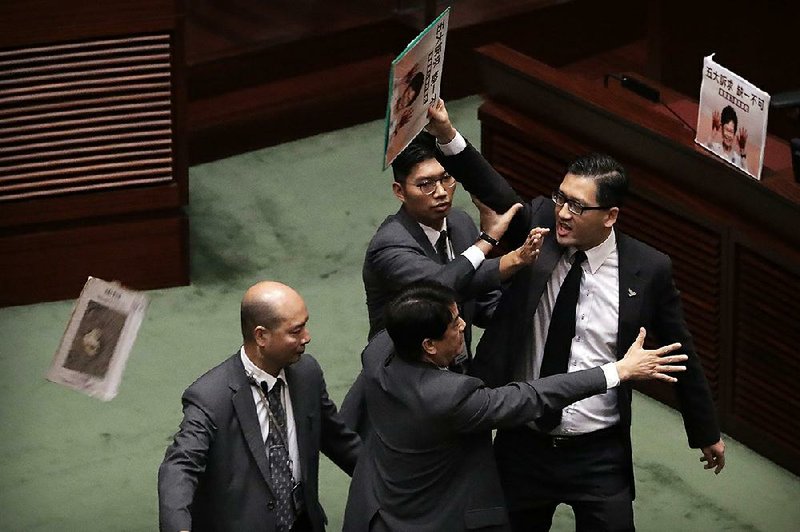HONG KONG -- Chinese authorities reacted angrily to the U.S. House of Representatives' passage of a bill that paves the way for economic sanctions against individuals who undermine Hong Kong's autonomy, as the city braced for fresh unrest and some lawmakers disrupted a much-anticipated policy speech by its embattled leader.
The Hong Kong Human Rights and Democracy Act, approved unanimously by the House on Tuesday, requires the U.S. government to consider annually whether it should continue to treat Hong Kong as a separate trading entity from mainland China in response to political developments in the city. That special status has allowed Hong Kong to cement its role as an international financial center and exempts its goods and services from the U.S. tariffs.
China promised Hong Kong a high degree of autonomy until 2047 -- a half-century after its handover from British rule, under a "one country, two systems" principle -- but Beijing has been tightening its grip. Activists say the ruling Communist Party has gradually chipped away at the rights enjoyed by the people of Hong Kong that do not exist in mainland China, such as an independent judiciary and freedom of assembly.
After months of clashes between pro-democracy protesters and riot police in Hong Kong sparked by now-shelved plans to allow extraditions to the mainland, the city's government invoked emergency powers this month to ban masks at protests, expanding a crackdown on demonstrators. The intensifying crackdown prompted U.S. lawmakers to propose the bill, which must get a green light from the Senate and White House to become law.
[Video not showing up above? Click here to watch » https://www.youtube.com/watch?v=UCl77CBmOMQ]
"The extraordinary outpouring of courage from the people of Hong Kong stands in stark contrast to a cowardly government that refuses to respect the rule of law or live up to the 'one country, two systems' framework, which was guaranteed more than two decades ago," House Speaker Nancy Pelosi, D-Calif., said Tuesday.
Republican senators said Wednesday that they want to move quickly on the legislation.
"Hong Kong is a high priority for me," GOP Sen. Jim Risch of Idaho, chairman of the Foreign Relations Committee, said. "We're going to move on it as rapidly as we can."
No date has been set yet for a vote on the Senate version of the House measure.
"I think we're going to get it up on the floor here fairly soon," Republican Sen. Marco Rubio of Florida, a China critic, told reporters.
On Wednesday, Chinese Foreign Ministry spokesman Geng Shuang voiced Beijing's "strong indignation and firm opposition" to the bill and said China would take strong measures to safeguard its interests.
He said the bill demonstrated a "naked double standard, which fully exposes the extreme hypocrisy of some people in the U.S. on the issues of human-rights and democracy and their sinister intentions to undermine Hong Kong's prosperity and stability and contain China's development."
Yang Guang, spokesman for China's Hong Kong and Macao Affairs Office, which oversees Hong Kong affairs, said the bill "openly supports the opposition and radical forces in Hong Kong."
For Hong Kong, the bill could lead to severe economic consequences. An end to the city's special trading relationship with the United States would erode the territory's advantages as a Western-friendly business hub and a regional base for numerous multinational firms.
The United States is Hong Kong's second-largest trading partner, with estimated two-way trade of $69 billion in 2017. It is also the second-largest destination for Hong Kong exports, which amounted to $42 billion.
Hong Kong's government issued a lengthy statement detailing the ways it abides by the "one country, two systems" framework.
"Safeguarding human rights and freedoms is a constitutional duty of the [Hong Kong] government," the statement said, adding that police have been acting with "restraint" and "been carrying out enforcement actions in strict accordance with the law."
On Wednesday, riot police sealed off the city's government buildings as Hong Kong leader Carrie Lam arrived to deliver a key policy address.
Minutes into her appearance at the legislative chambers, pro-democracy lawmakers heckled Lam and forced her to suspend her speech. Some held signs saying "Five Demands, Not One Less," a reference to protesters' demands, with an image of a smiling Lam featuring bloodied hands. Lam instead delivered the address via pre-recorded video.
Describing the territory as going through "major crisis," Lam said, "People are asking: Will Hong Kong return to normal?"
She appealed for its 7.5 million residents to "cherish the city," warning that "continued violence and spread of hatred will erode the core values of Hong Kong."
Information for this article was contributed by David Crawshaw, Shibani Mahtani and Anna Fifield of The Washington Post; by Daniel Flatley, Dandan Li, Iain Marlow, Li Liu, Sofia Horta e Costa, Christopher Anstey, Shelly Banjo and Eric Lam of Bloomberg News; and by John Leicester of The Associated Press.
A Section on 10/17/2019

